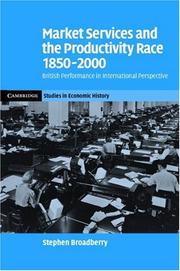| Listing 1 - 4 of 4 |
Sort by
|

ISBN: 0521867185 9780521867184 9780511495748 9780521123143 9780511349843 051134984X 0511495749 1107170621 128108591X 9786611085919 0511347995 1139132318 0511350740 0511348967 0521123143 Year: 2006 Volume: *3 Publisher: Cambridge Cambridge University Press
Abstract | Keywords | Export | Availability | Bookmark
 Loading...
Loading...Choose an application
- Reference Manager
- EndNote
- RefWorks (Direct export to RefWorks)
Now that services account for such a dominant part of economic activity, it has become apparent that achieving high levels of productivity in the economy requires high levels of productivity in services. This book offers a major reassessment of Britain's comparative productivity performance over the last 150 years. Whereas in the mid-nineteenth century Britain had higher productivity than the United States and Germany, by 1990 both countries had overtaken Britain. The key to achieving high productivity was the 'industrialisation' of market services, which involved both the serving of business and the provision of mass-market consumer services in a more business like fashion. Comparative productivity varied with the uneven spread of industrialised service sector provision across sectors. Stephen Broadberry provides a quantitative overview of these trends, together with a qualitative account of developments within individual sectors, including shipping, railways, road and air transport, telecommunications, wholesale and retail distribution, banking, and finance.
338 <09> <41> --- Economische geschiedenis--Verenigd Koninkrijk van Groot-Brittannië en Noord-Ierland --- 338 <09> <41> Economische geschiedenis--Verenigd Koninkrijk van Groot-Brittannië en Noord-Ierland --- Industrial productivity --- Service industries --- Industries --- Productivity, Industrial --- TFP (Total factor productivity) --- Total factor productivity --- Industrial efficiency --- Production (Economic theory) --- Regional disparities&delete& --- History --- Great Britain --- 19th century --- 20th century --- Europe --- Regional disparities --- History. --- Arts and Humanities

ISBN: 9780521189699 0521189691 0521793041 9780521793049 9780511523830 9781107321366 1107321360 0511523831 9781107315976 1107315972 1107143578 9781107143579 1139809660 9781139809665 1107316928 9781107316928 1107317894 9781107317895 1299399193 9781299399198 1107314992 9781107314993 Year: 2004 Publisher: Cambridge, UK New York Cambridge
Abstract | Keywords | Export | Availability | Bookmark
 Loading...
Loading...Choose an application
- Reference Manager
- EndNote
- RefWorks (Direct export to RefWorks)
This 2004 book explores the question of British exceptionalism in the period from the Glorious Revolution to the Congress of Vienna. Leading historians examine why Great Britain emerged from years of sustained competition with its European rivals in a discernible position of hegemony in the domains of naval power, empire, global commerce, agricultural efficiency, industrial production, fiscal capacity and advanced technology. They deal with Britain's unique path to industrial revolution and distinguish four themes on the interactions between its emergence as a great power and as the first industrial nation. First, they highlight growth and industrial change, the interconnections between agriculture, foreign trade and industrialisation. Second, they examine technological change and, especially, Britain's unusual inventiveness. Third, they study her institutions and their role in facilitating economic growth. Fourth and finally, they explore British military and naval supremacy, showing how this was achieved and how it contributed to Britain's economic supremacy.
Industrialization --- History. --- Great Britain --- Europe --- Foreign relations --- 338 <09> <41> --- Economische geschiedenis--Verenigd Koninkrijk van Groot-Brittannië en Noord-Ierland --- 338 <09> <41> Economische geschiedenis--Verenigd Koninkrijk van Groot-Brittannië en Noord-Ierland --- Exceptionalism --- Industrial revolution --- Technological innovations --- Revolution, Industrial --- Economic history --- Social history --- National characteristics --- Breakthroughs, Technological --- Innovations, Industrial --- Innovations, Technological --- Technical innovations --- Technological breakthroughs --- Technological change --- Creative ability in technology --- Inventions --- Domestication of technology --- Innovation relay centers --- Research, Industrial --- Technology transfer --- History --- Economic conditions --- History of Europe --- anno 1600-1699 --- anno 1700-1799 --- anno 1800-1899 --- Arts and Humanities --- Industrial revolution - Great Britain - History - Congresses --- Industrial revolution - Europe - History - Congresses --- Exceptionalism - Great Britain - Congresses --- Great Britain - Economic conditions - Congresses
Multi
ISBN: 9780521766937 9780521131858 0521766931 0521131855 9780511779619 9780511918292 0511918291 0511779615 1282818600 9781282818606 9780511914522 0511914520 9780511916328 0511916329 0511851618 9780511851612 1107208998 9781107208995 9786612818608 6612818603 0511917317 9780511917318 0511912714 9780511912719 Year: 2010 Publisher: Cambridge New York Cambridge University Press
Abstract | Keywords | Export | Availability | Bookmark
 Loading...
Loading...Choose an application
- Reference Manager
- EndNote
- RefWorks (Direct export to RefWorks)
The industrial revolution transformed the productive power of societies. It did so by vastly increasing the individual productivity, thus delivering whole populations from poverty. In this new account by one of the world's acknowledged authorities the central issue is not simply how the revolution began but still more why it did not quickly end. The answer lay in the use of a new source of energy. Pre-industrial societies had access only to very limited energy supplies. As long as mechanical energy came principally from human or animal muscle and heat energy from wood, the maximum attainable level of productivity was bound to be low. Exploitation of a new source of energy in the form of coal provided an escape route from the constraints of an organic economy but also brought novel dangers. Since this happened first in England, its experience has a special fascination, though other countries rapidly followed suit.
History of the United Kingdom and Ireland --- anno 1800-1899 --- Révolution industrielle --- --Angleterre --- --Énergie --- --Histoire économique et sociale --- --Industrie --- --Power resources --- Coal trade --- Industrial revolution --- Charbon --- Ressources énergétiques --- History. --- Commerce --- History --- 620.9 <41> --- 338 <09> <41> --- Economics of energy in general--Verenigd Koninkrijk van Groot-Brittannië en Noord-Ierland --- Economische geschiedenis--Verenigd Koninkrijk van Groot-Brittannië en Noord-Ierland --- Power resources --- 338 <09> <41> Economische geschiedenis--Verenigd Koninkrijk van Groot-Brittannië en Noord-Ierland --- Energy --- Energy resources --- Power supply --- Natural resources --- Energy harvesting --- Energy industries --- Coal industry --- Fuel trade --- Énergie --- Histoire économique et sociale --- Industrie --- Power resources - Great Britain - History. --- Coal trade - Great Britain - History. --- Industrial revolution - Great Britain. --- Révolution industrielle - Grande-Bretagne --- Charbon - Commerce - Grande-Bretagne - History --- Ressources énergétiques - Grande-Bretagne - History --- Angleterre
Multi
ISBN: 9781107003439 1107003431 9780511763366 9781107633124 1107633125 1139179705 1107226937 1139189433 9786613384003 1139188135 1139183516 0511763360 1283384000 1139190733 1139185829 9781139190732 9781139189439 9781139188135 6613384003 9781107226937 9781139179706 9781283384001 9781139183512 9781139185820 Year: 2012 Publisher: Cambridge New York Cambridge University Press
Abstract | Keywords | Export | Availability | Bookmark
 Loading...
Loading...Choose an application
- Reference Manager
- EndNote
- RefWorks (Direct export to RefWorks)
"This important new study examines the market trade of medieval England from a new perspective, by providing a wide-ranging critique of the moral and legal imperatives that underpinned retail trade. James Davis shows how market-goers were influenced not only by practical and economic considerations of price, quality, supply and demand, but also by the moral and cultural environment within which such deals were conducted. This book draws on a broad range of cross-disciplinary evidence, from the literary works of William Langland and the sermons of medieval preachers, to state, civic and guild laws, Davis scrutinises everyday market behaviour through case studies of small and large towns, using the evidence of manor and borough courts. From these varied sources, Davis teases out the complex relationship between morality, law and practice and demonstrates that even the influence of contemporary Christian ideology was not necessarily incompatible with efficient and profitable everyday commerce"--
Marchés --- Villes médiévales --- 338 <09> <41> --- 942.04 --- 942.03 --- Economische geschiedenis--Verenigd Koninkrijk van Groot-Brittannië en Noord-Ierland --- Geschiedenis van Engeland--(1399-1485) --- Geschiedenis van Engeland--(1154-1399) --- 942.03 Geschiedenis van Engeland--(1154-1399) --- 942.04 Geschiedenis van Engeland--(1399-1485) --- 338 <09> <41> Economische geschiedenis--Verenigd Koninkrijk van Groot-Brittannië en Noord-Ierland --- Marchés --- Commerce de détail --- Villes médiévales --- Markets --- Commerce --- History --- Moral and ethical aspects. --- England --- Social life and customs --- Cities and towns, Medieval --- Ethics --- Retail trade --- Social history --- Retail industry --- Retailing --- Marketing --- Shopping centers --- Wholesale trade --- Public markets --- Fairs --- Market towns --- Medieval cities and towns --- Social ethics --- History of the United Kingdom and Ireland --- History of civilization --- anno 1500-1799 --- Histoire sociale --- Morale --- History. --- Histoire --- Angleterre --- Moeurs et coutumes --- Arts and Humanities
| Listing 1 - 4 of 4 |
Sort by
|

 Search
Search Feedback
Feedback About UniCat
About UniCat  Help
Help News
News